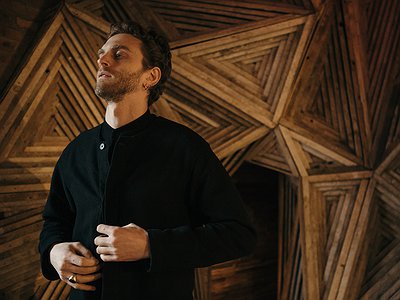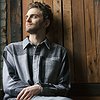Name: Greg Fox
Nationality: American
Occupation: Drummer, Multidisciplinary Artist, Teacher
Current Release: The Gradual Progression on RVNG Intl.
Recommendations: Hyperobjects by Timothy Morton, and Ian Cheng’s Emissary Trilogy
Website / Contact: If you enjoyed this interview with Greg Fox, his website is the ideal place to start your journey into his music.
When did you start writing/producing music - and what or who were your early passions and influences? What what is about music and/or sound that drew you to it?
I started writing stuff on the computer when I was probably about 14 or 15, using various computer programs like fruity loops and other free software I downloaded off the internet. Before that, I had been in a band throughout high school, so I was drumming all the while. Early passions and influences were myriad. Wu Tang Clan, The Cure, and Frank Zappa were some heavier early examples. I can’t explain what it was that drew me to music but I most of my memories from early childhood include listening to music my parents and grandparents had on, so maybe it is just as simple as it made an impression at a young age. I mean, I watched Sesame Street a lot …
For most artists, originality is first preceded by a phase of learning and, often, emulating others. What was this like for you? How would you describe your own development as an artist and the transition towards your own voice? What is the the relationship between copying, learning and your own creativity?
I think with drumming, I would hear the drumming in music that I liked and try to copy it - this became a tool for leveraging new skills on the instrument. I did the same when teaching myself guitar and bass, looking up tablature on the Internet and playing along to music I liked and then incorporating the chops I was picking up into things I would make up or improvise. At a certain point after playing those things over and over again they morph and become your own version, instead of a full on emulation - or in trying to copy or execute something, you “mess up,” and then land at a place you like but hadn’t intended on finding. I’ve made a lot of big advances with my playing that way, to the point that it has become a technique of sorts, seeing what happens if I throw myself in a direction gesturally. Sometimes I find things I wasn’t expecting to.
What were your main compositional- and production-challenges in the beginning and how have they changed over time?
The main compositional challenge remains that I can’t read music. I started learning in high-school, but the teacher left half way through the year, and his replacement was not very inspiring, to say the least … So I kind of lost interest at the time and never got around to picking up where I left off. I do understand intervals and scales, and I can read rhythm to a certain extent, but I can’t write music on paper in a classical sense. If I could Matrix-style download that skill, I would do so in a heartbeat.
So anyway, because of this shortcoming of sorts, I have learned other methods of getting ideas down and concretizing them. And I'm learning more and more how to communicate those ideas to other musicians for live playing or recording - the latter part is still mostly new territory for me, but my new record is a big leap forward in that regard, at least as far as the implementation of accompaniment is concerned.
What was your first studio like? How and for what reasons has your set-up evolved over the years and what are currently some of the most important pieces of gear for you?
My first studio was in college, and it was a very small room with a drum set inside. That’s it - over time some amps piled up in there, and various bands would practice in the space. I also was fortunate enough to have an art studio for some of that time, and I was focusing on creating work in there related to my studies. Having the space to make work was liberating, and I sincerely miss it. I’ve not done any significant visual artwork since I got out of school, mainly because of my total focus on music. After school, I ended up with a studio space at the Market Hotel in Bushwick, Brooklyn - that again was just a place for drums and amps. I moved on from there to some other shitty basement studio situations that I shared with various projects and other people’s bands. I got to do a residency at Pioneer Works last year and that ruined the dank basement studio rental vibe for me, having spent time in a spacious room with a big window I realized I couldn’t take my creative process back into underground cramped, windowless spaces. Luckily, I moved to a place in Gowanus this past spring where I can live and work, and I now have been assembling the dream home studio situation: drums, amps, computer / electronics setups, all set up in the same room as my bed and plants.
Most important pieces of gear are Drums, Sensory Percussion first and foremost, my computer, without which Sensory would not work, and then my more recent modular synthesizer situation, which has been a growing interest over the past two years or so.
How do you make use of technology? In terms of the feedback mechanism between technology and creativity, what do humans excel at, what do machines excel at?
I currently depend on Sensory Percussion and the computer to realize my solo work. For me, so much of my creativity begins gesturally, and the technologies I use are very good at receiving those gestures, which then allow me to create a framework around how processing will interpret those gestures. It has taken a while, but now between Sensory Percussion, Ableton, and modular synthesis, I have a lot of different ways to create ripples in a field of creative possibility, which I can then harness and repeat based on the settings I save, patches I make, etc. It is a very fruitful feedback system. I feel like I’m only just getting started.
Production tools, from instruments to complex software environments, contribute to the compositional process. How does this manifest itself in your work? Can you describe the co-authorship between yourself and your tools?
I think I began to answer this question above. I throw spaghetti at the wall, some of it sticks, and some of it doesn’t. Then, I readjust or rethink the approach and throw some more spaghetti - and repeat until I feel like I have created an environment that maintains a lot of creative possibilities while also having some boundaries within which I can play. Another way of thinking about it is akin to tuning. I sit at a machine (sometimes metaphorically, sometimes literally) and make a gesture and listen - and then adjust the tuning until I feel like the instrument is resonating with me - it's a sort of internal creative/emotional lateral line, and when it starts vibrating I know I’m getting somewhere.
Collaborations can take on many forms. What role do they play in your approach and what are your preferred ways of engaging with other creatives through, for example, file sharing, jamming or just talking about ideas?
Almost all of my work is collaborative. I have never really done much file sharing, but I would like to try … More of my collaborations take place in person, often in the form of jamming, and sometimes in conversation as well. Again, it feels like the approach in collaboration is similar to how I described the way in which I create individually above. The difference is you are not only resonating with the music you are making, but also the other person or people you are making it with - so the potential for all that vibration is a lot greater if everyone ends up on the same page. Again, you just sort of reach a point where you know you have something when everyone is glowing. Sometimes it takes longer than others to achieve that point, but you kind of just keep working at it when you know the people you are working are the right people. Sometimes if it takes longer, it is because the result will be more internally and collectively resonant. Other times you end up finding out that it's all wrong, and you move on. There is an extensive amount of variety concerning all the possibilities that could arise from various collaborations - this is to say in different relationships of any kind - sometimes you realize and supersede that inherent perceived potential, and other times, you end up with something you don’t want. But I think the process is always valuable and can inform other situations that may come later on down the line.



